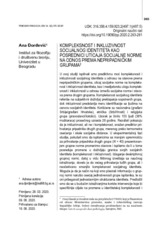Prikaz osnovnih podataka o dokumentu
Kompleksnost i inkluzivnost socijalnog identiteta kao posrednici uticaja socijalne norme na odnos prema nepripadničkim grupama
Social Identity Complexity and Inclusiveness as Mediators of the Impact of a Social Norm on Attitudes towards Outgroups
| dc.creator | Đorđević, Ana | |
| dc.date.accessioned | 2021-10-21T11:46:02Z | |
| dc.date.available | 2021-10-21T11:46:02Z | |
| dc.date.issued | 2020 | |
| dc.identifier.issn | 1821-0147 | |
| dc.identifier.issn | 2334-7287 | |
| dc.identifier.uri | http://rifdt.instifdt.bg.ac.rs/123456789/2289 | |
| dc.description.abstract | U ovoj studiji ispitivali smo prediktivnu moć kompleksnosti i inkluzivnosti socijalnog identiteta u odnosu na stavove prema nepripadničkim grupama, uticaj socijalne norme na kompleksnost i inkluzivnost identiteta, kao i medijatorsku ulogu kompleksnosti i inkluzivnosti u odnosu između socijalne norme i stavova prema drugim grupama. Kompleksnost socijalnog identiteta referiše na subjektivni doživljaj preklapanja sopstvenih grupa, dok inkluzivnost predstavlja meru identifikacije sa ljudima na osnovu socijalnih identiteta. Korišćene su nacionalna (građani Srbije/građani Hrvatske), etnička (Srbi/Hrvati) i religijska grupa (pravoslavci/katolici). Uzorak je činilo 153 ljudi (36% muškaraca) prosečnog uzrasta 26 godina. Rezultati pokazuju da je inkluzivnost, ali ne i kompleksnost, snažan prediktor prihvatanja pripadnika drugih grupa, merenog preko termometra osećanja i skale socijalne distance. U eksperimentalnoj fazi studije, pokušali smo da ispitanicima sa manjom spremnošću za prihvatanje pripadnika drugih grupa (N = 40) prezentovanjem grupne norme promenimo stavove i ispitamo da li u tome posreduje promena u doživljaju granica svojih socijalnih identiteta (kompleksnost i inkluzivnost). Izlaganje deskriptivnoj grupnoj normi, datoj u vidu fiktivnog izveštaja sa naučnog istraživanja, dovelo je do većeg prihvatanja tuđih grupa, ali i neočekivano smanjilo kompleksnost socijalnog identiteta. Moguće je da je način na koji smo plasirali informaciju o grupnoj normi narušio osećaj jedinstvenosti grupe ispitanika, te su oni pribegavali jednostavnijim strukturama identiteta. Predložili smo da se u budućim istraživanjima koriste intervencije koje bi specifičnije ciljale na promene u identitetskoj kompleksnosti i inkluzivnosti, kao i da se porede iste intervencije na različitim grupama. | sr |
| dc.description.abstract | In this study, we investigated the predictive power of social identity complexity and inclusiveness on attitudes towards outgroups, the impact of a social norm on social identity complexity and inclusiveness, and their mediating role in the relationship between social norm and attitudes towards outgroups. Social identity complexity refers to individual's subjective representation of interrelationships between his/ her multiple social identities. Social identity inclusiveness refers to individual's identification with other people based on mutual group membership. We opted for national, ethnic and religious ingroups and outgrops. A total of 153 respondents (36% male), average age of 26, filled in the questionnaire. Results show that inclusiveness, unlike complexity, strongly predicts outgroup acceptance, measured with feelings thermometer and social distance scale. In the experimental phase of the study, we tried to induce changes in outgroup acceptance by presenting descriptive social norm to selected participants (N = 40) with lower initial acceptance. We also investigated mediating role of the perception of one's own ingroup boundaries (complexity and inclusiveness) in this process. Exposure to social norm, presented in the form of fictive scientific report, improved outgroup acceptance, but unexpectedly decreased social identity complexity. This might be due to the fact that the way in which social norm was designed has threatened distinctiveness of our respondents' identity, which consequently led to less complex perception of their own ingroup boundaries. For further research, we suggested introducing more specific interventions that would directly influence social identity complexity and should be compared among different groups. | sr |
| dc.language.iso | sr | sr |
| dc.publisher | Novi Sad: Filozofski fakultet | sr |
| dc.relation | info:eu-repo/grantAgreement/MESTD/inst-2020/200025/RS// | sr |
| dc.rights | openAccess | sr |
| dc.rights.uri | https://creativecommons.org/licenses/by/4.0/ | |
| dc.source | Primenjena psihologija / Applied Psychology | sr |
| dc.subject | međugrupni odnosi | sr |
| dc.subject | socijalni identitet | sr |
| dc.subject | socijalne norme | sr |
| dc.subject | stavovi prema nepripadničkim grupama | sr |
| dc.subject | attitudes towards outgroups | sr |
| dc.subject | intergroup relationships | sr |
| dc.subject | social identity | sr |
| dc.subject | social norms | sr |
| dc.title | Kompleksnost i inkluzivnost socijalnog identiteta kao posrednici uticaja socijalne norme na odnos prema nepripadničkim grupama | sr |
| dc.title | Social Identity Complexity and Inclusiveness as Mediators of the Impact of a Social Norm on Attitudes towards Outgroups | sr |
| dc.type | article | sr |
| dc.rights.license | BY-NC-ND | sr |
| dcterms.abstract | Ђорђевић, Aна; Комплексност и инклузивност социјалног идентитета као посредници утицаја социјалне норме на однос према неприпадничким групама; Комплексност и инклузивност социјалног идентитета као посредници утицаја социјалне норме на однос према неприпадничким групама; | |
| dc.citation.issue | 2 | |
| dc.citation.volume | 13 | |
| dc.citation.spage | 263 | |
| dc.citation.epage | 281 | |
| dc.identifier.doi | 10.19090/pp.2020.2.263-281 | |
| dc.identifier.doi | 10.19090/pp.2020.2.263-281 | |
| dc.type.version | publishedVersion | sr |
| dc.identifier.fulltext | http://rifdt.instifdt.bg.ac.rs/bitstream/id/8149/knjigor,+##default.groups.name.manager##,+263-281.pdf |

